#feline history
Explore tagged Tumblr posts
Text
Ragdolls and Ragamuffins
A Ragdoll cat is a pointed breed with blue eyes. Most variations from that are not considered Ragdolls.
These points will be significantly darker than the base of their bodies. ↓↓↓


A Ragamuffin can be any color or coat pattern except pointed. They can have any eye color.
This breed was created by crossing Ragdolls with other longhaired cats, including Turkish Angoras, Himalayans, Persians and longhaired domestic cats. ↓↓↓


CONTROVERSY
The founder of Ragdoll cats and owner of Josephine (founder mother cat of the Ragdolls), Ann Baker, held stringent control over the breed and its classifications. This didn’t sit well with some admirers and caused a group of Ragdoll breeders to depart from Baker and her strict rules. After some hostile years, the group ended up with the Ragamuffin breed.
CREDITS TO LITTER ROBOT BLOG & ASPCA PET INSURANCE
#cat#cute#cat facts#cat fact#cats#interesting#science#genetics#biology#animals#ragdoll#ragdoll cat#ragdoll breed#ragdoll cat breed#ragamuffin#ragamuffin cat#ragamuffin breed#ragamuffin cat breed#cat breeds#cat breed origins#feline#feline history#cat history#cat controversy
27 notes
·
View notes
Text
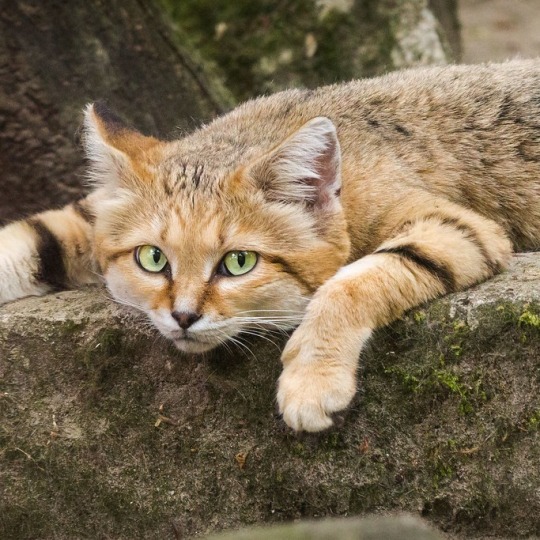
Meet the sand cat (Felis margarita). This small, solitary feline inhabits arid regions—including Africa’s Sahara Desert and parts of Asia. Built for desert life, the thick soles of this cat’s paws allow it to walk on scorching sand during the day and cold sand at night. In parts of its range, daytime temperatures can soar up to 124° Fahrenheit (51° C) and then plummet to 31° Fahrenheit (-0.5° C) by night. The sand cat is also a “fearless snake hunter” known to pursue snakes (even venomous vipers) for a meal.
Photo: Cloudtail the Snow Leopard, CC BY-NC-ND 2.0, flickr
#science#nature#natural history#animals#cool animals#did you know#animal adaptations#fact of the day#cats#cat#caturday#feline
1K notes
·
View notes
Text

~ Nose Ornament.
Date: A.D. 2nd–6th century
Placeoforigin: Perú
Culture: Vicús
Medium: Gold
#ancient#ancient art#history#museum#archeology#archaeology#nose Ornament#south america#peruvian#peru#pre columbian#gold#vicús#feline#cat#2nd century#6th century
1K notes
·
View notes
Text

House cat toying with a mouse By: Stephen Dalton From: Natural History Magazine 1989
212 notes
·
View notes
Text
For #Caturday:
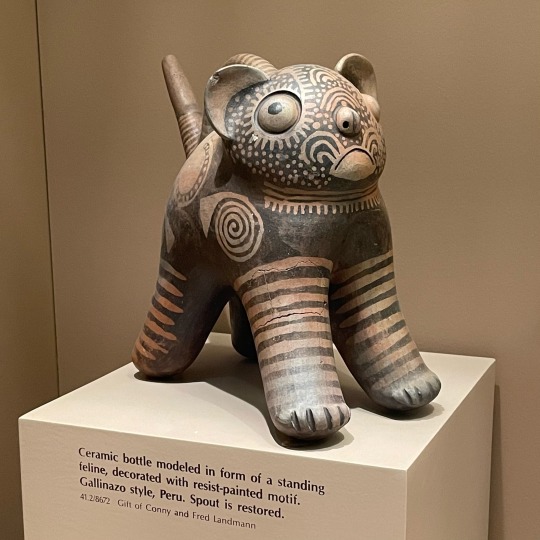
Ceramic bottle modeled in the form of a standing feline, decorated with resist-painted motif. Gallinazo style (aka Virú culture), NW Peru, Early Intermediate Period, c. 200 BCE - 600 CE. Spotted at the American Museum of Natural History NYC.
PS: this vessel may depict the Peruvian subspecies of Pampas Cat aka Northern Colocolo (Leopardus colocola garleppi). The Andean Mountain Cat (Leopardus jacobita) is also often suggested, but their range is more southern and higher elevation than where the Virú were? Also note the stripier legs on the Colocolo similar to the ceramic:
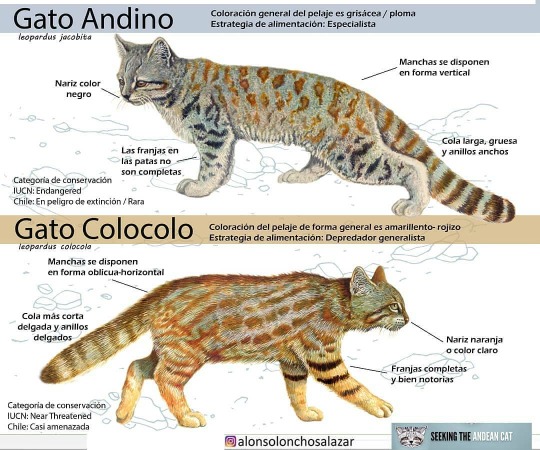
#cat#cats in art#feline#ceramics#effigy vessel#pre-conquest#Peruvian att#South American art#Indigenous art#Gallinazo#Virú#American Museum of Natural History#museum visit#Caturday#animals in art#Pampas Cat#Colocolo#Andean Mountain Cat#wild cats#mammalogy#zoology#species ID#ID#infographic#Peruvian art
3K notes
·
View notes
Text

The Black Orchid, 1907
Frederick Stuart Church
#Frederick Stuart Church#art#art history#american art#green dress#felines#painting#oil on canvas#1900s
230 notes
·
View notes
Note
clanmew-ish question here:
if a human were to ever listen to different cats speak clanmew, parkmew, etc. (different dialects) would they be able to tell the difference? does it sound different to them? had say, a human who owns a cat then later encounters a clan cat and heard them both speak, would there be a difference in the kittypet’s dialect and the clan cat’s dialect that the human can actually notice?
are the humans able to decode / kinda of understand what the cats are saying if they pay attention to say, erin’s project? say one cat keeps saying “Krrrp” at a stone then would the humans figure out that “Krrrp” is the cat word for stone? and if they do, can they figure out other cat words? and finally, if they can, can they “talk” to cats like pointing to a stone and going “Krrrp” and having the cat actually understand them?
Laypeople cannot; Researchers eventually can.
It's EXACTLY like cetaceans. The noises don't hit human ears quite right unless you're extremely familiar with the sounds a certain pod makes. Orcas have "accents" and you can call a dolphin by playing back a recording of its name, though we haven't proven actual grammar and language yet.
Clanmew is not discovered until sometime around 2030 or later, though, despite the project starting in 2008 when a cat attacks a bulldozer and sets off a chain of events that finally allows a program to get funding. Other languages aren't discovered until much, much later.
Generally though, in-universe, humans have a hard time speaking cat words and vice versa. It's not impossible, but it takes a ton of training and most housecats are just as laidback and uneager to please as their real counterparts.
(Though out of universe, it is possible to speak Clanmew and I make sure all words are technically pronouncible. Because it's more fun that way.)
#It's also probably a skill that cats need to practice so language does tend to die off easier in felines#But this region is VERY chatty in particular because of Lakemew and all of its descendant languages#But this is beyond the scope of the project and im not trying to explore the worldwide alt history here#Alexander the Great and his battle cat who has 30 cities named after it lmao#Millie's Radio Collar#Better bones au
90 notes
·
View notes
Photo
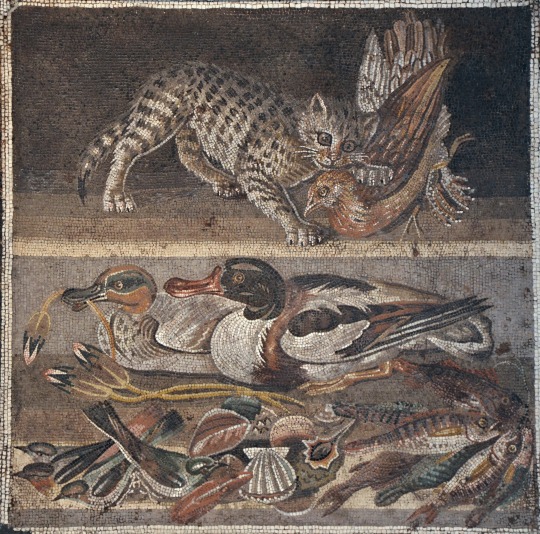
Mosaic depicting a cat with a partridge (above) and ducks, fish & shellfish (below),
From the House of the Faun, Pompeii, Italy,
Late 2nd Century BCE
Naples Archaeological Museum
#art#design#animals#feline#cat#duck#mosaic#partridge#fissh#pompeii#italy#history#roman#style#2nd century BCE#house of the faun#mythology
162 notes
·
View notes
Text






We visited the cat exhibit at the Field Museum and had a great time with a couple friends who are just as crazy about their cats lol 😻
X
#field museum#museum#museum of natural history#cats#catblr#feline#cat lady#photography#latenightsushi
8 notes
·
View notes
Text
CATS: A Timeless Muse in Art
— From Egyptian Hieroglyphs to Van Gogh's Post-Impressionism and Munch's Expressionism, felines grace the canvas of Art History. 🐈
📹: chansapphira
#cats#felines#art history#Egyptian Hieroglyphs#Post-Impressionism#Expressionism#Van Gogh#Edvard Munch#art#timeless muse
19 notes
·
View notes
Text





#fashion#moodboard#fashion world#it girl#fashion model#fashion history#fashion week#fashion women#magazine#animal print#feline#femme fatale#im just a girl
8 notes
·
View notes
Text

Smile like Smilodon, because it’s Fossil Friday! This saber-tooth cat roamed the Americas during the Pleistocene, and went extinct some 10,000 years ago. Scientists estimate that its signature teeth, which could reach lengths of 7 in (18 cm), grew at the rapid speed of .24 in (6 mm) per month—double the growth rate of an African lion’s teeth. To unsheathe these knife-like canines, Smilodon could open its jaws twice as wide as today’s big cats.
You can spot this fearsome predator in the Museum’s Hall of Primitive Mammals. We're open daily from 10 am–5:30 pm! Plan your visit.
Photo: D. Finnin / © AMNH
#science#amnh#museum#fossil#nature#animals#natural history#dinosaur#paleontology#fact of the day#mammals#cats#feline#did you know#cool animals#museum of natural history#natural history museum#big cats#smilodon#sabertooth#sabertooth cat#pleistocene#jaws#fossils#fossil friday
902 notes
·
View notes
Text

Xu Beihong
Cat and Yellow Butterfly
20th Century
#Xu Beihong#chinese artist#Chinese painter#chinese painting#cats#cats on tumblr#catblr#beautiful cats#beautiful animals#butterfly#butterflies#cat art#feline#cute cats#adorable cats#modern art#art history#aesthetictumblr#tumblraesthetic#tumblrpic#tumblrpictures#tumblr art#aesthetic#tumblrstyle#beauty
49 notes
·
View notes
Text

"Pep"
The dog who was sentenced to life in prison for killing Pennsylvania governor's cat, 1924.
#art#surreal#photography#funnyshit#funny shit#pup#dog#animal#criminal#cat#feline#life prison#pennsylvania#american history#1924#sentenced#pep#animals rights
8 notes
·
View notes
Text
Happy #InternationalCheetahDay!
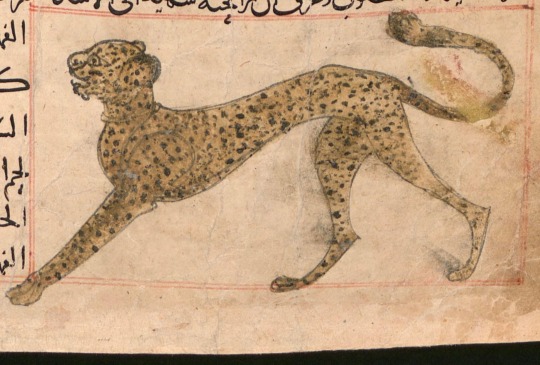
Here is the cheetah in Zakariya al-Qazwini's 'Aja'ib al-Makhluqat wa Ghara'ib al-Mawjudat (The Wonders of Creatures and the Marvels of Creation), an important work of Islamic cosmography which was probably first written in the 1260s, and for centuries after was reproduced across the Islamic world. This illuminated manuscript copy was made in Wasit, Iraq in 1280 CE and is the earliest known surviving version.
#animals in art#animal holiday#cheetah#feline#wild cat#Islamic art#Wonders of Creation#illuminated manuscript#illustration#natural history art#al-Qazwini#Manuscript Monday#International Cheetah Day
401 notes
·
View notes